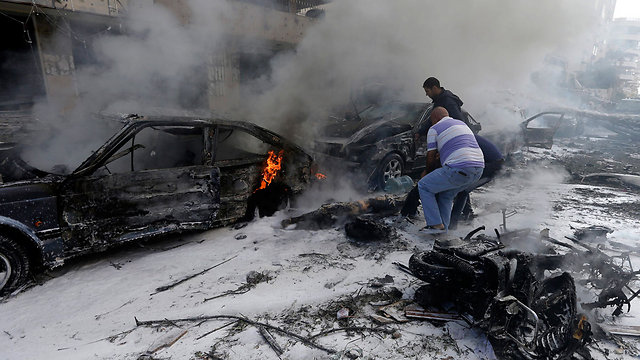An engineering team defused the vehicle and prevented a large explosion. In the aftermath, Lebanese media speculated as to the manner in which the attack was stopped. The current assessment: Hezbollah is operating unmanned aircrafts.
Related stories:
- Hezbollah affiliated media release Beirut blast footage
- Official: Lebanon IDs Iranian Embassy bombing suspects
- Magic Wand missile interceptor passes new test
On Monday, security officials told the Lebanese paper Al-Jumhuriyah that "the vehicle was tracked upon entrance to Arsal on the border with Syria and until it arrived in the area between Younin and Maqneh."
It was further reported that Hezbollah men had opened fire on the car and were caught in a fire-fight with the militants in a vehicle accompanying the explosive car. The Lebanese military arrived soon after the incident.
In the wake of the event, security officials appraised the situation to the paper, explaining that Hezbollah recently obtained information on possible car bombs penetrations into the Beqaa Valley through the eastern and north-eastern borders. "The organization is performing tracking and surveillance on the border through the use of UAVs at night," the report claimed.
Bombing of Iranian embassy in Beirut (Photo: AP)
Hezbollah has close to 200 Iranian-made UAVs. Part of the unmanned fleet is destined for kamikaze actions on strategic national targets in Israel or IAF bases during the next crisis which is bound to occur between the adversaries.
The options at Nasrallah's disposal include many models of UAVs, including kamikaze planes capable of low-altitude flights to evade detection by radar.
The IDF's answer to the new alignment is the fighter jets of the IAF, who on two previous occasions have shot down Hezbollah UAVs. The Hawk surface-to-air missile system can also be used to target the UAVs.
Lebanese 24-hour news channel, Al Jadeed, aired a clip of Nasrallah in Dehieh surrounded by a ring of bodyguards during the Ashura celebrations. The event was captured by amateur photographers.
One day before the prevented attack, Hezbollah Secretary-General Hassan Nasrallah warned the Iranian embassy will continue to be a target to for terror attacks," according to a report in the Lebanese Al Akhbar, which identifies with the terror organization.
Nasrallah clarified: "They didn't achieve their target, and they will continue to try until they hit their target."
According to the Secretary-General, the embassy attack relied on a new type of explosive designed to maximize destruction.
Yoav Zitun contributed to this report
- Receive Ynetnews updates
directly to your desktop

















